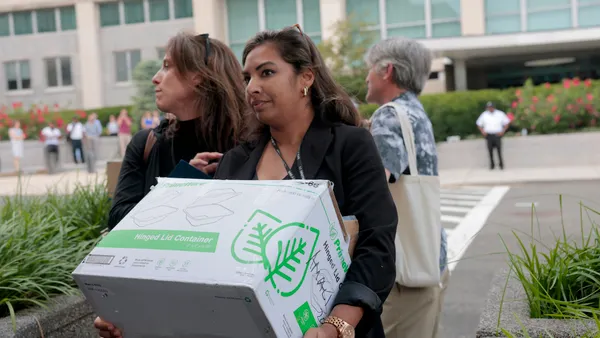UPDATE: Nov. 5, 2019: Shake Shack's four-day workweek test is now in one third of its U.S. restaurants, CEO Randy Garutti told investors during an earnings call. The company is listening to managers to understand their lifestyles and the kind of things that they want.
Dive Brief:
- Shake Shack is testing a four-day work week in Las Vegas as part of its efforts to increase manager retention, CEO Randy Garutti said during the JPMorgan investment conference last Thursday.
- The company has also rolled out an equity program for general managers meant to help with turnover since it gives these employees a stake in the company, he said. The company provided additional equity awards of $10,000 to each general manager, Garutti said during a February earnings call.
- "It has never been harder to find great people to lead restaurants," Garutti said.
Dive Insight:
While a four-day work week is becoming increasingly popular across Europe, it has yet to catch on across the U.S. — and certainly not in the quick-service restaurant space. But labor issues, such as a worker shortage and rising wages, are starting to impact the restaurant industry, causing companies to rethink their growth plans.
While Shake Shack has 36 to 40 sites planned for this year, it could grow 100 sites, Garutti said. But the chain won't because there just aren't enough leaders to manage the restaurants, he said.
Restaurants are turning to multiple avenues to increase retention. Some are offering to repay tuition for their chefs while others are hiring former prisoners to work in the kitchen, according to the New York Times. Papa John's is offering to cover tuition costs for corporate employees pursuing degrees online through Purdue University College. Chick-fil-A's educational scholarship program has reportedly helped boost retention, according to Restaurant Business. Papa Murphy's will bring its in-store career path training program, One Bite at a Time, to its entire system by the end of the year. The program, which is available at 700 units, focuses on skills rather than positions, and is meant to improve recruitment and retention, CEO Weldon Sprangler said during a March conference call with investors.
While Shake Shack is only testing the four-day work week on a small scale, a handful of full-service restaurants have already started to roll it out. Aloha Hospitality, which owns about 10 sports-themed bars and a fine-dining restaurants in Alabama, launched a four-day work week for its restaurant managers in late 2018 to help increase morale, retention and boost a sense of team ownership. Managers receive two days off in a row and a day off during each week. Chefs are rolling out the concept as well to provide better work-life balance in Europe.
The four-day work week has been found to improve overall employee satisfaction. A study done in New Zealand revealed that this work week decreased stress by 7% and increased satisfaction at work by 5%, according to Fast Company. The four-day work week can increase productivity, result in better team building and reduce unemployment rates. On the other hand, it can be expensive, especially when workers don't meet their work requirements, and sometimes workers still put in the same hours — resulting in more overtime pay.















